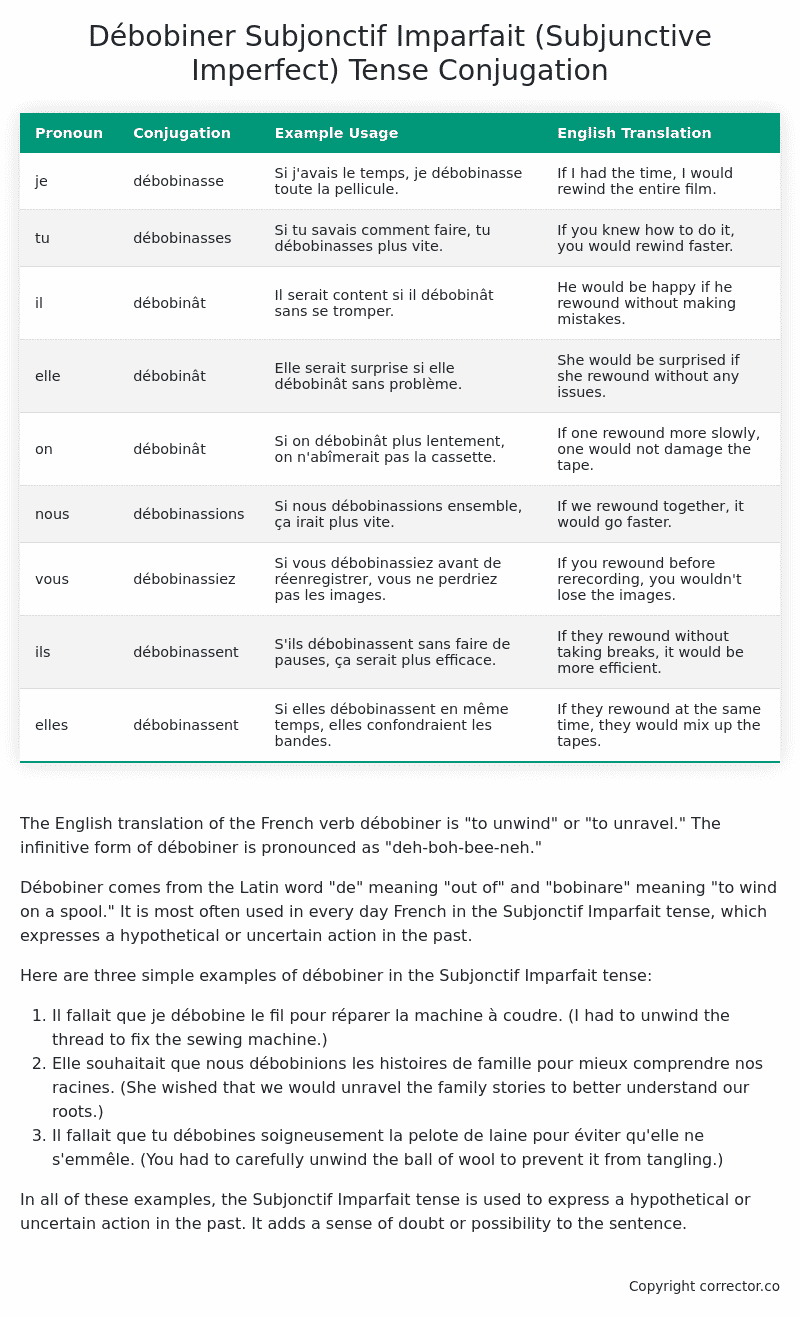Subjonctif Imparfait (Subjunctive Imperfect) Tense Conjugation of the French Verb débobiner
Introduction to the verb débobiner
The English translation of the French verb débobiner is “to unwind” or “to unravel.” The infinitive form of débobiner is pronounced as “deh-boh-bee-neh.”
Débobiner comes from the Latin word “de” meaning “out of” and “bobinare” meaning “to wind on a spool.” It is most often used in every day French in the Subjonctif Imparfait tense, which expresses a hypothetical or uncertain action in the past.
Here are three simple examples of débobiner in the Subjonctif Imparfait tense:
- Il fallait que je débobine le fil pour réparer la machine à coudre. (I had to unwind the thread to fix the sewing machine.)
- Elle souhaitait que nous débobinions les histoires de famille pour mieux comprendre nos racines. (She wished that we would unravel the family stories to better understand our roots.)
- Il fallait que tu débobines soigneusement la pelote de laine pour éviter qu’elle ne s’emmêle. (You had to carefully unwind the ball of wool to prevent it from tangling.)
In all of these examples, the Subjonctif Imparfait tense is used to express a hypothetical or uncertain action in the past. It adds a sense of doubt or possibility to the sentence.
Table of the Subjonctif Imparfait (Subjunctive Imperfect) Tense Conjugation of débobiner
| Pronoun | Conjugation | Example Usage | English Translation |
|---|---|---|---|
| je | débobinasse | Si j’avais le temps, je débobinasse toute la pellicule. | If I had the time, I would rewind the entire film. |
| tu | débobinasses | Si tu savais comment faire, tu débobinasses plus vite. | If you knew how to do it, you would rewind faster. |
| il | débobinât | Il serait content si il débobinât sans se tromper. | He would be happy if he rewound without making mistakes. |
| elle | débobinât | Elle serait surprise si elle débobinât sans problème. | She would be surprised if she rewound without any issues. |
| on | débobinât | Si on débobinât plus lentement, on n’abîmerait pas la cassette. | If one rewound more slowly, one would not damage the tape. |
| nous | débobinassions | Si nous débobinassions ensemble, ça irait plus vite. | If we rewound together, it would go faster. |
| vous | débobinassiez | Si vous débobinassiez avant de réenregistrer, vous ne perdriez pas les images. | If you rewound before rerecording, you wouldn’t lose the images. |
| ils | débobinassent | S’ils débobinassent sans faire de pauses, ça serait plus efficace. | If they rewound without taking breaks, it would be more efficient. |
| elles | débobinassent | Si elles débobinassent en même temps, elles confondraient les bandes. | If they rewound at the same time, they would mix up the tapes. |
Other Conjugations for Débobiner.
Le Present (Present Tense) Conjugation of the French Verb débobiner
Imparfait (Imperfect) Tense Conjugation of the French Verb débobiner
Passé Simple (Simple Past) Tense Conjugation of the French Verb débobiner
Passé Composé (Present Perfect) Tense Conjugation of the French Verb débobiner
Futur Simple (Simple Future) Tense Conjugation of the French Verb débobiner
Futur Proche (Near Future) Tense Conjugation of the French Verb débobiner
Plus-que-parfait (Pluperfect) Tense Conjugation of the French Verb débobiner
Passé Antérieur (Past Anterior) Tense Conjugation of the French Verb débobiner
Futur Antérieur (Future Anterior) Tense Conjugation of the French Verb débobiner
Subjonctif Présent (Subjunctive Present) Tense Conjugation of the French Verb débobiner
Subjonctif Passé (Subjunctive Past) Tense Conjugation of the French Verb débobiner
Subjonctif Imparfait (Subjunctive Imperfect) Tense Conjugation of the French Verb débobiner (this article)
Subjonctif Plus-que-parfait (Subjunctive Pluperfect) Tense Conjugation of the French Verb débobiner
Conditionnel Présent (Conditional Present) Tense Conjugation of the French Verb débobiner
Conditionnel Passé (Conditional Past) Tense Conjugation of the French Verb débobiner
L’impératif Présent (Imperative Present) Tense Conjugation of the French Verb débobiner
L’infinitif Présent (Infinitive Present) Tense Conjugation of the French Verb débobiner
Struggling with French verbs or the language in general? Why not use our free French Grammar Checker – no registration required!
Get a FREE Download Study Sheet of this Conjugation 🔥
Simply right click the image below, click “save image” and get your free reference for the débobiner Subjonctif Imparfait tense conjugation!

Débobiner – About the French Subjonctif Imparfait (Subjunctive Imperfect) Tense
Formation
Common Everyday Usage Patterns
Interactions with Other Tenses
Subjonctif Présent
Indicatif Passé Composé
Conditional
Conditional Perfect
Summary
I hope you enjoyed this article on the verb débobiner. Still in a learning mood? Check out another TOTALLY random French verb conjugation!


